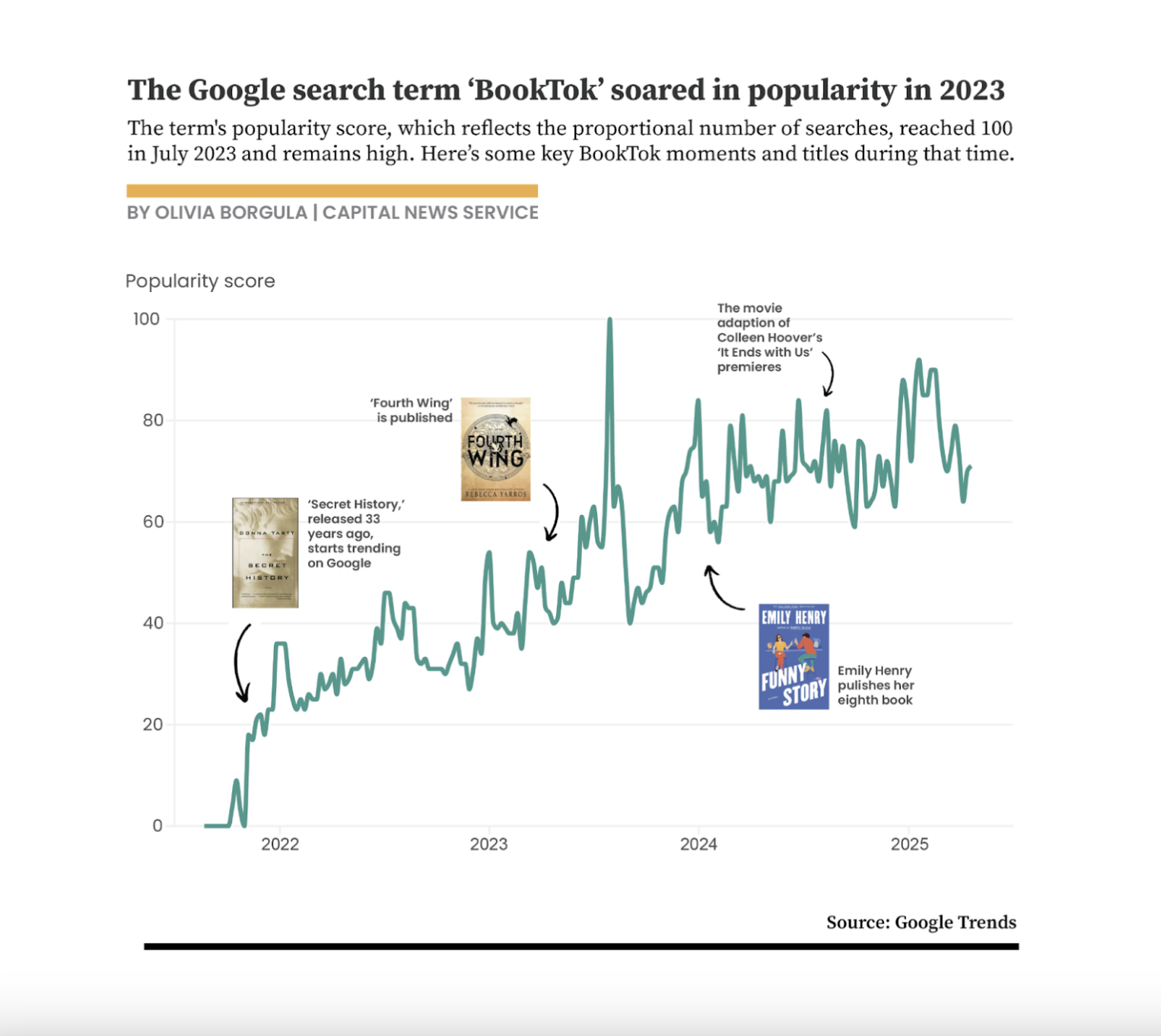Gianna Traina read “The Seven Husbands of Evelyn Hugo” because it soared in popularity online.
Then she picked up “Daisy Jones & The Six” by the same author, which led her to “Malibu Rising” — her favorite book.
Traina, a University of Maryland student, keeps up with “#BookTok”, a viral trend made up of book reviews and reading content that regularly garners millions of views and has thrusted authors into the spotlight.
The trend is one of many reasons why Maryland librarians and booksellers aren’t concerned about the future of reading despite an overall decline in booksale earnings in the last two decades.
After Kindles were released in 2007, bookstore sales around the country declined for eight years straight. They hit a low during the COVID-19 pandemic with $6.5 billion, and while they’ve started to recover, they still hadn’t rebounded to pre-pandemic levels when the latest data was recorded in 2023.
At the same time, Kindles soared in popularity, especially in recent years. The e-readers’ year-over-year sales in the last quarter of 2024 were up by more than 30%, marking the best period for the device in the last decade, according to Amazon’s earnings report.
Traina said while she was at first opposed to the idea of owning a Kindle, she now primarily uses one because it’s easier and quicker to access books.
“Kindles have so many options for free books,” she said. “But I do have literally four physical books on my desk.”
The BookTok craze took off during the COVID-19 pandemic, spiking in Google searches in 2022. Novels published decades ago, like Donna Tartt’s “Secret History,” reached post-pandemic online notoriety.

The trend contributed to an about 30% increase in print book sales for the young adult genre in the beginning of 2022, according to Publisher’s Weekly. As of April, the #BookTok hashtag on TikTok has amassed more than 200 billion views and led to authors like Colleen Hoover, who has been publishing books since the early 2010s, making the New York Times bestseller list for 162 weeks, or more than three years. It’s wildly more successful than its predecessors, “Bookgram” on Instagram and “BookTube” on YouTube.
Bookstores and libraries have capitalized on the frenzy, with companies like Barnes & Noble setting up splashy BookTok displays in stores and advertising lists of the most popular books from the trend online.
And despite a nationwide slow in bookstore support, Barnes & Noble is opening new stores after years of slowed profits. The bookstore giant plans to open 60 more U.S. locations this year, following 57 new stores in 2024 and 30 in 2023, according to data from Morning Brew.
Emma Snyder, owner of The Ivy Bookshop in Baltimore, said 2025 has been the store’s strongest year yet and predicted it will remain that way. After the COVID-19 pandemic, Snyder said she noticed more people buying physical books, which she attributes to a cultural shift away from technology in an increasingly digital age.
Bookstores help people find community as they grapple with the future and can be an act of resistance for some, she said.
“We’re constantly told that the future is an inexorable march towards the technological optimization of our species,” she said. “Books are this universal connection to a previous moment in our own lives.”
Tamar Sarnoff, public libraries and state networking director for the Maryland State Library Agency, said books, particularly from libraries, are important to build connections in communities.
Sarnoff added that libraries function as “third places” — a term describing areas that foster informal, free social interaction outside of the home and workplace.
Across 200 Maryland library locations, meeting rooms were used more than 200,000 times in 2023, according to Maryland public library statistics published through the state library agency.
“[Library patrons] don’t have to buy a coffee, they don’t have to listen to whatever music somebody’s put on,” Sarnoff said. “They can make the space what it needs to be.”
But like bookstores, Maryland libraries were hit with the general shift away from books in the 2000s and 2010s. While as of 2024 overall visits have rebounded to pre-pandemic levels, there’s been an overall decline in the last decade.
Traina, who typically reads 20 to 30 books a year, said she keeps coming back to reading because it’s a way to relax.
“It gets easy to get caught up and forget about yourself,” she said. “Sometimes making time for myself and not being on a screen and reading is nice.”


You must be logged in to post a comment.